14 Day Egypt Itinerary Cairo and Nile Cruise and Red sea
От USD 3'150
+14 Дополнительные услуги
Day 1 Arrival to Hurghada
Upon arrival at Hurghada airport, our REP will meet and assist you at the airport and transport you to your hotel in Hurghada .
overnight in Hurghada
►Day 2 The Pyramids of Giza and Cairo Museum:
Our tour guide will pick you up from your hotel in Hurghada for a short flight to Cairo at 8 am arrive at cairo at 9:45 and enjoy a great excursion to The Pyramids of Giza ( Cheops, Chephren, and Mykerinus). Then proceed to visit the Great Sphinx, which dates back to the time of and visit the Valley Temple.
Lunch will be served during the Pyramids at the local restaurant in Giza
Then visit the Egyptian Museum
The Museum of Egyptian Antiquities in Tahir
It exhibits a rare collection of over 250,000 genuine artifacts that date as far back as 5000 years, including an exclusive exhibit dedicated to the Tutankhamen - A collection of treasures, gold, and jewelry that were buried in his tomb for over 3,500 years before they were discovered in 1920 when his tomb was excavated.
If you wish to visit the mummies royal hall. You need to ask the tour guide to take the National Museum of Egyptian Civilization and you pay for this. It will cost 200 Egyptian Pounds
The New Grand museum is not open yet. It will be open soon maybe end of 2024
Overnight in the Hotel Cairo
Optional trip to the sound and the light show at Giza Pyramids and costs 40 $ Per person
► Day 3- Grand Museum Memphis-Sakkara
We will pick you up from your hotel by Marsa Alam tours guide to enjoy Cairo Day Tour to
New Museum then visit Memphis and Sakkara Pyramids. You will start with the Step Pyramid at Sakkara, which is considered the world's oldest major stone structure. It was built in the 3rd Dynasty for King Djoser. Then Proceed to have your lunch at a local restaurant. After that transfer to Memphis which was founded by King Menes, and was the capital of Egypt during the Old Kingdom, it was considered to be a center of rule and culture for over 3000 years the first capital of Egypt, and see the Statue of Ramses II and the Alabaster Sphinx of Memphis. Then drive to your hotel.
►Day 4 Cairo to the white desert
At 0700 am Pick up time from your hotel in Giza or Cairo, drive to Bahariya Oasis, which located about 350 km east of Cairo This journey takes about 4 hours, arrive at 10:00 there will be stops during the trip for WC and Coffee
At 10:00 you will take your 4x4 Jeep and drive to the black desert
12:00 The Lunch will be served here in El Haize oasis
13:00 Then drive to the valley of Agabat
15:00 Arrive at the Valley of Agabat is deep within the white desert . You have to be there to feel the out-worldly beauty of the place. Millions of years ago, the place used to be under the sea. Over the years, unique rock formations of limestone, chalk (and maybe sand) developed.
16: 30 explore the white desert National Park, the most well-known desert destination in Egypt.
17:30 Make tents and Enjoy the sunset
18:30 As the sky turns pink then the deepest fiery orange, the rock-shapes fade, and silence are all around. Sitting around a small fire and enjoying the simplest meal of chicken, rice, and vegetables, you will feel like nothing has ever tasted so good. Bedouin staff will arrange dinner and desert camping.
►Day 5 -White desert - Bahariya oasis- Cairo
At 06:00 am Enjoy sunrise
At 07:00 Am you'll enjoy breakfast in the desert, before driving to Bahariya Oasis
At 09:00 On the way back, you will visit Crystal Mountain , Crystal Mountain , locally known as Gebel al-Izzaz. It's more of a crystal hill, seen on the right, often called the Jewel of the desert, formed by the quartzite crystals and looks amazing in the sun's rays. A few decades ago, that natural feature has been found by accident.
►The crystal mountain
11:00 Drive to Bahariya Oasis, Soak in the heat at Bir Sigam, a hot spring that can help to relax. Located at 7 km east of Bahariya on the Cairo road, the spring is the best hot spring in temperature,
In The summertime will stop at Bir Madi( which is a cold spring)
12:00 Then drive back to Cairo. Arrival at Cairo at 16:30- Overnight in Cairo
► Day 6-Aswan attractions
Pick up from your hotel in Cairo early morning for a flight to Aswan . You will meet your guide there
you will visit Aswan attractions, including the Temple of Philae, and tour by Felucca around Elephantine, the High Dam, the Unfinished Obelisk
Phiala temple:
Built to honor the goddess Isis, this was the last temple built in the classical Egyptian style. Construction began around 690 BC, and it was one of the last outposts where the goddess was worshipped.
The high dam:
Aswan High Dam is a rock-fill dam located at the northern border between Egypt and Sudan. The dam is fed by the River Nile and the reservoir forms Lake Nasser. Construction for the project began in 1960 and was completed in 1968. It was officially inaugurated in 1971.
The Unfinished Obelisk :
Aswan was the source of ancient Egypt’s finest granite, used to make statues and embellish temples, pyramids, and obelisks. The large unfinished obelisk in the Northern Quarries has provided valuable insight into how these monuments were created, although the full construction process is still not entirely clear. Three sides of the shaft, nearly 42m long, were completed except for the inscriptions. At 1168 tonnes, the completed obelisk would have been the single heaviest piece of stone the Egyptians ever fashioned.
12:00 lunch on board the Cruise
Optional trip to the Nubian village
The Nubian village is one of Aswan's attractions. It's worth visiting and spending 2 hours. The place is very authentic and genuine, Colorful and artistic, the Nubian Village will surprise you in every corner! While walking in the village, you will straight away feel the soul of this place!
Dinner &overnight on board the Cruise
Meals: Breakfast-Lunch-Dinner
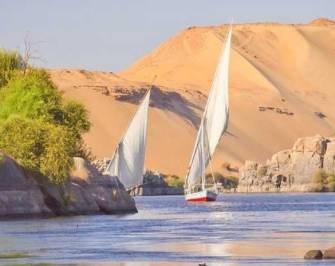
► Day 7 Abu Simbel- and Kom Ombo
Breakfast & Lunch on board the cruise.
Early Visit to Abu Simbel from Aswan
Abu Simbel temples:
The two temples of Ramses the second and the Queen Nefertari were carved out of the Mountain on the west bank of the Nile between 1274 and 1244 B.c, The Great Temple was dedicated to Ramses the second, Ra-Harakhty, Amun Ra, and Ptah, with 4 Colossal statues, The second temple was dedicated to The Queen Nefertari and Goddess Hathor, the two temples were dismantled stone by stone and rebuilt on higher ground, The preservation of the two temples of Abu Simbel must Rank as the greatest Achievement of the Unesco.
lunch on the Nile cruise
13:00 Sail to Kom Ombo
The temple of Kom Ombo:
The temple and the associated settlement site are located 40 K.m north of Aswan, the temple was dedicated to the deities Sobek and Horus and date mainly to the Ptolemaic and Roman periods (332 B.b -395 A.c)
Sail to Edfu-Overnight in Edfu
Dinner &overnight on board the Cruise
Galabyia Party.Breakfast & Lunch on board the cruise.
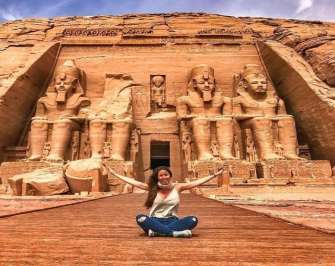
► Day 8 - Karnak temple-Luxor temple
Breakfast on the board on the Nile cruise, Breakfast on the Nile Cruise, Visit the Edfu around 08:00 by horse carriage
Edfu temple :
Upper Egyptian site dominated by a large well -Preserved temple, dedicated to the hawk-God Horus, The Construction of Ptolemaic temple of Horus, which was founded on the site of a much earlier temple, dated to the period between the reigns of Ptolemy the Third(246 B.c), The descriptions on the walls include the Myth of contending of Horus and Seth(Probably performed annually as a religious Drama
You will be back around 10:00
Lunch on the Cruise
At 10:30 Sail to Luxor through Esna lock
Arrive at Luxor at 18:00
Visit Luxor temple.
Luxor Temple:
Largely built by the New Kingdom Pharaoh Amenhotep the Third and Completed by King Tutankhamon and the Great King Ramses the second, The First pylon was raised by Ramses the second and Decorated with His Military Battle of Kadesh
Dinner &overnight on board the Cruise
Optional trip to the sound Light Karnak  temple - 40 $ P.PBreakfast on the board on the Nile cruise, Breakfast on the Nile Cruise, Visit the Edfu around 08:00 by horse carriage
temple - 40 $ P.PBreakfast on the board on the Nile cruise, Breakfast on the Nile Cruise, Visit the Edfu around 08:00 by horse carriage
Dinner &overnight on board the Cruise
Optional trip to the sound Light Karnak  temple - 40 $ P.P
temple - 40 $ P.P
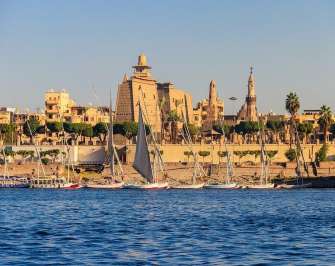
► Day 9- Valley of Kings- and Karnak temple
Early Hot air Balloon ride over the valley of the Kings then back to the cruise for
Breakfast on the board on the Nile cruise Then Disembarkation Visit the west bank of Luxor and Karnak  karnak Egypt 360
karnak Egypt 360
The Valley of the Kings:
Once called the great Place of the Truth, this valley is Called now the valley of the Kings, It is a Majestic domain of the Pharaohs who once lay in great stone Sarcophagi, awaiting immortality, The isolated valley behind Deir el Bahri is dominated by the Pyramid-Shaped Mountain Peak
The colossi of Memnon:
Massive pair statues Known as the Colossi of Memnon, Rising about 18 M from the plain, are the remains of what was once the largest complex on the west bank, Built by Amenhotep the Third
The Queen Hatshepsut temple :
Rising out of the desert Plain, in a series of terraces, The temple of Hatshepsut Mergs with sheer limestone cliffs on the eastern face of the Theban Mountain as if Nature herself had built this Extraordinary monument.
Karnak  temple :
temple :
Karnak  is more than A temple, is a spectacular Complex of Sanctuaries, Kiosks, Pylons, and Obelisks, All dedicated to the Theban gods and to the Greater Glory of Egypt`s Pharaohs, Karnak
is more than A temple, is a spectacular Complex of Sanctuaries, Kiosks, Pylons, and Obelisks, All dedicated to the Theban gods and to the Greater Glory of Egypt`s Pharaohs, Karnak  was the Most Important place for the worship of the Theban Triad(Amun, Mut, and Khonso)
was the Most Important place for the worship of the Theban Triad(Amun, Mut, and Khonso)
Lunch will be served during the trip
Overnight in Luxor
Day 10 Valley of the Queen
You will meet your guide at 9 am at your hotel to enjoy a full day in the west bank of luxor
to visit
Madinat Habu temple :
In ancient times Madinat Habu was known as Djanet and according to ancient belief was the place was Amun first appeared. Both Hatshepsut and Tuthmosis III built a temple dedicated to Amun here and Later Rameses III constructed his larger memorial temple on the site.
First Pylon – the temple of Rameses III During his time Djanet became the administrative center of Western Thebes. The whole temple complex was surrounded by a massive fortified enclosure wall, with an unusual gateway at the eastern entrance, known as the pavilion gate. This structure, a copy of Syrian migdol fortresses is something you would not expect to see in Egypt. Rameses III, a military man probably saw the virtue in such a structure. It is likely Rameses resided here from time to time because a royal palace was attached at the south of the open forecourt of this temple, while priests’ dwellings and administrative buildings lay on either side of the temple. Originally a canal with a harbor outside the entrance connected the temple to the Nile. But this was obliterated by the desert long ago.
Madinat Habu temple from the air
Ramsseum:
Ramesseum, funerary temple of Ramses II (1279–13 BC), erected on the west bank of the Nile River at Thebes in Upper Egypt. The temple, famous for its 57-foot (17-meter) seated statue of Ramses II (of which only fragments are left), was dedicated to the god Amon and the deceased king. The walls of the Ramesseum, which is only about half preserved, are decorated with reliefs, including scenes depicting the Battle of Kadesh, the Syrian wars, and the Festival of Min
Deir El Madina:
The main cemetery of the royal workmen at Deir el-Medina is situated to the west of the village, on the slope of the Theban hills. Most of the tombs were built during the 19th dynasty. Some of them are impressive in their decoration and size. By the time of the 20th dynasty, the tombs had been turned into family tombs in which the descendants of the original owners were buried. Little alterations were made apart from the addition of another subterranean burial chamber. The lower courses of the eastern hill of Qurnet Murai were the site of burials of babies and children. More than a hundred children were buried in common domestic pottery jars or amphorae, in baskets, even fish baskets, in chests, boxes or in proper coffins there. The poorest burials were those of still-born babies. They contained no jewelry or amulets, only small vessels filled with food for the afterlife. The adults' graves were situated higher up. Many of these graves date from the 18th dynasty
Lunch During the tour.
The Valley of The Queens:
The Valley of the Queens, also known as Biban el-Harim, Biban el-Sultanate, and Wadi el-Melikat, is a place in Egypt where wives of Pharaohs were buried in ancient times. In ancient times, it was known as Ta-Set-Neferu, meaning - 'the place of the Children of the Pharaoh', because along with the Queens of the 18th, 19th and 20th dynasties (1550-1070 BCE) many princes and princesses were also buried with various members of the nobility. The tombs of these individuals were maintained by mortuary priests who performed daily rituals and provided offerings and prayers for the deceased nobility.
The valley is located near the better known Valley of the Kings on the west bank of the Nile across from Thebes (modern Luxor) . This barren area in the western hills was chosen due to its relative isolation and proximity to the capital.
The kings of the 18th dynasty, instead of the traditional building of pyramids as burial chambers (perhaps because of their vulnerability to tomb robbers), now chose to be buried in rock-cut tombs.
This necropolis is said to hold more than seventy tombs, many of which are stylish and lavishly decorated. An example of this is the resting place carved out of the rock for Queen Nefertari (1290-1224 BCE) of the 19th Dynasty. The polychrome reliefs in her tomb are still intact.
The ancient Egyptians gave it the name Set Neferu, meaning "seat of beauty". From 1903-1906 an Italian expedition discovered about eighty tombs, some of which belonged to children of royalty. Many were severely damaged having been burned and or reduced to being used as stables for donkeys and camels. One of the most well-known tombs is that of Nefertari, the best-loved of Ramesses II's numerous wives. In her honor, he built a beautiful temple at Abu Simbel.
On the Evening you can Enjoy An Optional Tour Sound and Light Show at Karnak:
The show starts with a historical introduction covering the birth of the great city of Thebes and erection of the Karnak Temple.
The show narrates the glorious achievements of some great Pharaohs as you listen to a magnificent and poetic description of the artistic
overnight in luxor
Day 10 Dendera - Hurghada:
Breakfast at your hotel then you will be accompanied by your private tour guide and a private air-conditioned vehicle to visit:
Drive to Dendera temple.
Dendera temple:
The Temple of Hathor was largely constructed during the Late Ptolemaic period, specifically during the reign of Ptolemy XII and Cleopatra VII. Later additions were made during the Roman period. Although built by a dynasty of rulers who were not native Egyptians themselves, the design of this temple has been found to be in accordance to that of other classical Egyptian temples, with the exception of the front of the hypostyle hall, which, according to an inscription above the entrance, was constructed by the Emperor Tiberius.
Apart from these, there are also scenes in the temple complex portraying the Ptolemaic rulers. For example, carved onto the external face of one of the temple walls is a huge relief of Cleopatra VII and her son by Julius Caesar and co-ruler, Ptolemy XV (better known as Caesarion). The two Ptolemaic rulers are shown dressed in Egyptian garb, and offering sacrifices.
Hathor was also regarded as a goddess of healing, and this is evident in the presence of a sanatorium in the temple complex. Here, pilgrims would come to be cured by the goddess. Sacred water (which was made holy by having it poured onto statues inscribed with sacred texts) was used for bathing, unguents were dispensed by the priests of Hathor, and sleeping quarters were provided for those hoping that the goddess would appear in their dreams, and so aid them.
Then drive to Hurghada
lunch on the way
Overnight in Hurghada resort
Day 11 Hurghada free day
Optional Excursion
1- Orange bay Island Snorkeling Trip
Fantastic snorkelling trip with relaxation on the desert island on the beautiful Red Sea, where we will do snorkelling in different spots which are full of corals and magnificent colourful fish with open buffet lunch aboard the cruise then return back to the jetty and then transferred to your hotel in Hurghada .
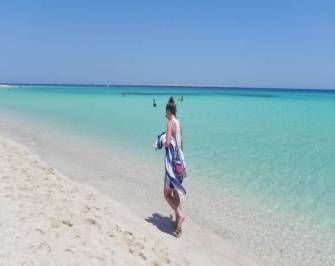
Day 12 Hurghada free day
Optional Excursion
1- Hurghada Bedouin Desert Safari by Jeep 4x4
Discover Hurghada Safari Tours into the desert with the Bedouin people. You will transfer to Egypt's Eastern Desert to a Bedouin village for riding camel discover their culture while enjoying the view of the sunset.
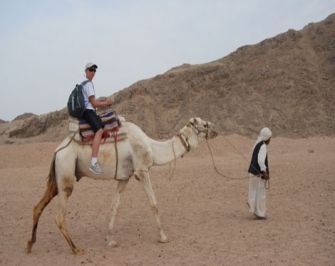
Day 13 Hurghada free day
Enjoy a free day at the beach
overnight in Hurghada Resort
Day 14 Final depart
Enjoy a half day at the resort. You can pay extra for late check out if you have late flight
check out from your hotel and we will transfer you to Hurghada airport for your flight back home.
Основной момент
- ►The Pyramids of Giza
- ►The Sphinx
- ►Cairo museum
- ►The Valley of Kings
- ►Karnak temple
- ►Luxor temple
- ►Queen Hatshepsut temple
- ►Colossi of Memnon
- ►Edfu temple
- ►Kom Ombo temple
- ►The high dam
- ►Phiala temple
- ►Visit the new Library of Alexandria
- ► White desert
- ► Memphis and sakkara
- ► Grand Museum
- ► Pick-up service at Hurghada Airport.
- ► 3 nights at 5* hotel in Cairo( bed and breakfast basis.
- ► 3 nights at 5* Nile cruise between Aswan and Luxor- Full Board basis
- ► 1-night Camping in the white desert)
- ► 2 nights in Luxor
- ► Flight tickets { Hurghada -Cairo - Cairo Aswan }
- ► An escorted knowledgeable tour guide all over the tour.
- ► 4 nights in Hurghada Resort all inclusive
- ► All your transportation during the tour with a private A.C car
- ► Entering fees for all the mentioned sightseeing on the itinerary.
- ► All Service Charges and taxes
- ► Hot air balloon
- ► International Airfare.
- ► Egypt entry visa.
- ► Tipping
- Drinks at restaurants or cruise
- ► Optional Tours
► Please remember to bring:
- ► Passports valid 6 months
- ► Hat
- ►Suncreams
- ► SunglassesIncluded






